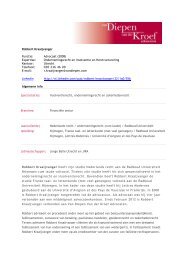© Van Diepen Van der Kroef Advocaten
© Van Diepen Van der Kroef Advocaten
© Van Diepen Van der Kroef Advocaten
- No tags were found...
Create successful ePaper yourself
Turn your PDF publications into a flip-book with our unique Google optimized e-Paper software.
necessary that change is there effectuated. The UN and the State of the Netherlands assertin the researches financed by them (UN Report and NIOD Report) that lessons have beenlearned from their errors. The Association et al. repeats that what is at issue here are notthe decisions themselves but the implementation thereof. It is unacceptable that the UnitedNations should be the only organisation in the world that is not subject to judicial review forany instance of unlawful conduct, including permitting the commission of genocide. Finally,the Association et al. points out once more that Section 29 of the Convention provides for areview by an independent court. The manifestly so undesirable influencing assumed by theDistrict Court is thus already provided for in the Convention. The Association et al. merelyclaims what is already obligatory un<strong>der</strong> international law.Ground of appeal 9110. The District Court erroneously held un<strong>der</strong> legal consi<strong>der</strong>ation 5.15 that:‘Neither does the available, but scant, jurisprudence about the scope of the norm of article105 paragraph 1 of the UN Charter afford grounds for the conclusion that a national court,if and insofar as it has scope for review, can proceed in any other way than with theutmost reticence.In its Advisory Opinion of April 29, 1999 on the immunity of a UN worker the InternationalCourt of Justice rules that possible wrongful acts committed by the UN are not open toassessment by national courts, but should take place in the context of specific disputesettlement as provided for in Article VIII, paragraph 29 of the Convention (DifferenceRelating to Immunity from Legal Process of a Special Rapporteur of the Commission onHuman Rights, Advisory Opinion, I.C.J. 1999, p. 62, paragraph 66). There are no legalgrounds for the assertion that the lack of an adequate provision within the meaning ofArticle VIII, paragraph 29 warrants any infringement of the principal rule of Article 105paragraph 1 of the UN Charter, even irrespective of (1) whether it is at issue in this caseand of (2) the question what scope for review the court would have had.’<strong>©</strong> <strong>Van</strong> <strong>Diepen</strong> <strong>Van</strong> <strong>der</strong> <strong>Kroef</strong> <strong>Advocaten</strong> page 48 of 99
















